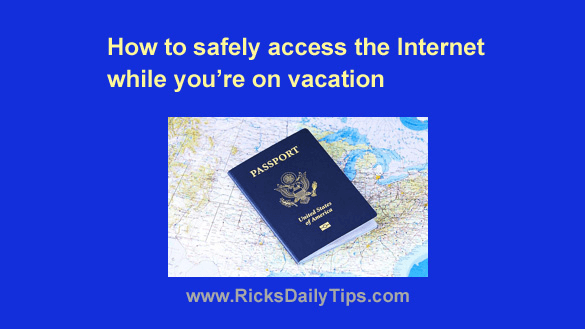 In today’s connected world, taking a vacation doesn’t necessarily mean you’ll have to forgo using the Internet while you’re enjoying some tropical paradise or hiking some wilderness trail.
In today’s connected world, taking a vacation doesn’t necessarily mean you’ll have to forgo using the Internet while you’re enjoying some tropical paradise or hiking some wilderness trail.
In fact, there aren’t that many places left in the world where you simply cannot find a way to get your laptop or mobile device connected to the web.
Unfortunately, using the Internet while you’re away from home is risky business unless you know how to do it safely.
Virtually every vacation destination on the planet has hackers and scammers waiting in the shadows for the opportunity to steal the money and identities of as many unsuspecting victims as possible.
The good news is there are ways to protect yourself from the miscreants of the world while you’re enjoying your time away from the rat race.
Here are a few tips for keeping your private information private and your identity all your own while you’re on vacation:
1- Never use the open, un-encrypted WiFi at a restaurant or other establishment to visit any website that requires you to log in or provide sensitive personal information unless there is simply no other alternative for accessing the Internet at your current location.
2 – If you simply have no choice but to use an open WiFi connection, make sure you use a really good Virtual Private Network (VPN) app such as IP Vanish.
Using a VPN will ensure that all of your Internet data will be transmitted over the web in a secure manner.
3 – Make sure that any website that offers the option of using https encryption is actually using it by installing the fantastic HTTPS Everywhere browser extension.
Believe it or not there are still a few popular websites that only use https encryption on their login pages, leaving the rest of the site un-encrypted. HTTPS Everywhere will force the use of encryption on the other pages as well.
4 – Never allow your web browser to store your login passwords.
If your browser stores your passwords and you lose your laptop or mobile device, whoever finds it will have full access to all of your online accounts.
If you’re currently using stored passwords, this post explains how to get rid of them.
5 – If you don’t keep your devices locked with a password at home, make sure you put a password on them before leaving for vacation.
A bootup or login password won’t prevent an experienced hacker from breaking into your machine, but it will prevent most casual thieves from gaining access to a stolen device.
6 – Always be on the lookout for “Evil Twin” Wifi Networks.
These are fake WiFi networks that mimic real ones, but were set up solely to steal your sensitive personal and login information. This post explains how to recognize and avoid them.
Bottom line: It’s fairly easy to access the Internet in most parts of the world these days, but it’s also easy to get yourself into some serious trouble if you aren’t careful.
The tips above can help you practice safe computing while you’re enjoying your vacation.